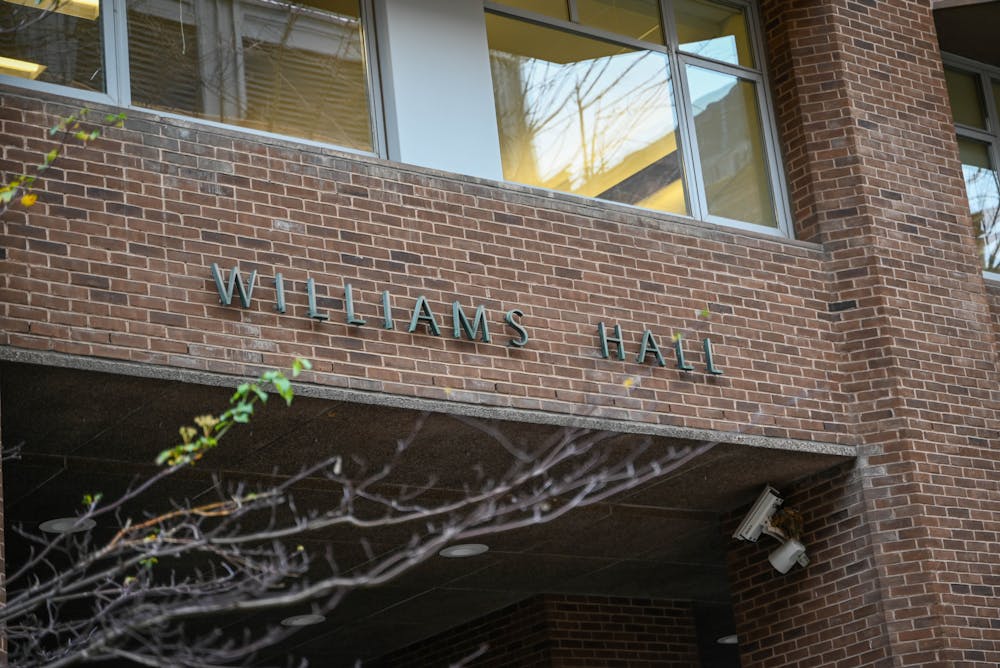Egyptian activist and writer Adelrahman ElGendy spoke at Wolf Humanities Center on Feb. 15 about his participation in the Arab Spring and subsequent imprisonment in Egypt.
ElGendy reflected on his political activism and literary career in conversation with Abdelrahman Atta, lecturer in Arabic in the Department of Near Eastern Languages and Civilizations. The event, which was titled "To Sing the Truth and Name the Liars," drew around 30 attendees.
ElGendy began by discussing his active participation in the Arab Spring, a series of anti-government uprisings that took place in the 2010s. ElGendy said that he was unaware of political specifics until 2013, when protests broke out across Egypt calling for the removal of the dictator.
"The government responded with a crackdown on protestors," ElGendy said. "Massacres and mass arrest had become the new norm."
After seeing a friend suffer the loss of her father due to police brutality during the Arab Spring, he knew that he had to participate and began regularly attending protests. He described his first protest as a moving and life-changing experience.
“I pushed my body into the masses and chanted until I lost my voice. For the first time, I moved as part of something bigger," ElGendy said. "I soaked in the revolution to the bones. How have I ever lived any other way?”
On his way to a large rally in Cairo on Oct. 6, 2013, 17-year-old ElGendy was arrested after taking a video from his car window of police who showed up at the protest. The police officer also detained his father, who was driving the car, to meet his arrest quota for that day. The father and son were then detained together in a police station, before being moved to a pre-trial prison.
“It was one of the worst experiences of my life," ElGendy said. "We had to sleep on top of each other, that is not a metaphor — in layers; first layer of people, second layer..."
After being mistakenly tried as an adult, ElGendy was sentenced to 15 years. However, he was pardoned after spending six years in a maximum-security prison. His father was released within four years.
ElGendy said he started writing in prison to cope with the trauma he endured. He first wrote small extracts and smuggled them to his family during visitations. His family posted his extracts on social media, and his joy after receiving comments and feedback inspired him to continue.
“The notion that whatever I endured had a purpose, even one existing only in my head at the time, slicked my world with a surreal scene," ElGendy said. "Because [for a story] to exist, at least one person needs to know about it. There is no hope for justice if no one remembers."
ElGendy’s desire to write motivated him to finish college despite being in prison. Within five years, he graduated with a degree in mechanical engineering from Ain Shams University.
ElGendy is currently a Dietrich Fellow at the University of Pittsburgh pursuing nonfiction writing. He is also working on his memoir titled "We Write on Walls" and is involved with lobbying for the release and pardon of other prisoners in Egypt.
“This book is the last thing that I need for closure. I feel very blessed to think that I’m doing the thing that I wanted to do all those years in prison,” ElGendy said. "We need to end this chapter for them too. We need to make sure these people are not forgotten."
The event was part of the Wolf Humanities Center's series throughout the academic year focused on the theme of revolution. Past events included film screenings, panels, and lectures on topics related to revolution across the globe.
Hye-Jung Park, an educator in Philadelphia, attended the event to hear ElGendy speak. She said that "fighting for freedom is important" to her, having experienced growing up in South Korea during a dictatorship.
Andy Bader, a volunteer for Penn Medicine Hospice, said that he attended the event to learn more about the Arab Spring from the perspective of a person who experienced it firsthand.
Concluding his remarks, ElGendy called upon the audience to continue to be optimistic and continue fighting for justice, despite the current conflicts in the Middle East.
“Everyone always talks about the metaphor ‘a light at the end of the tunnel.' And it got me thinking: what if there was no light at the end of the tunnel?" El Gendy said. “And then I started thinking about what it means to be the light in the tunnel. What matters isn’t finding the light, but being the light."









